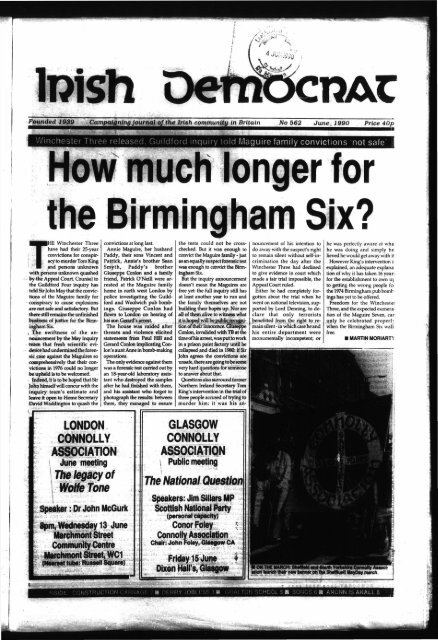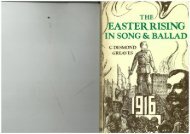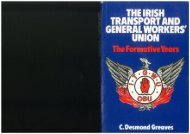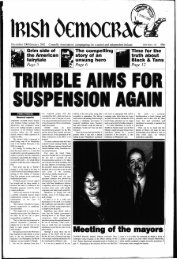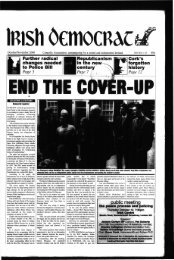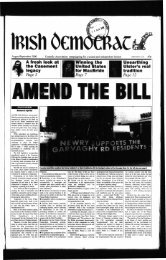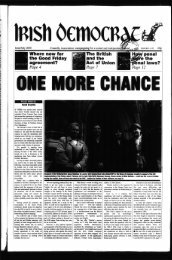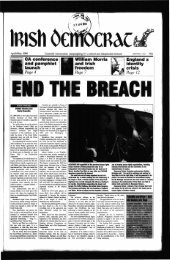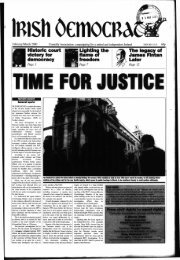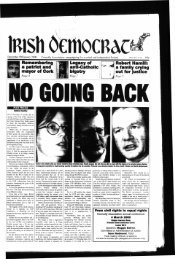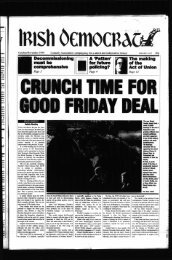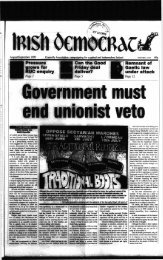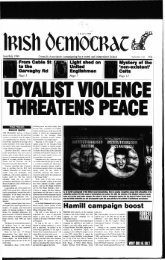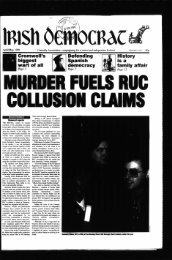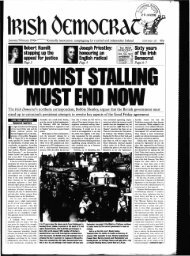Irish Democrat June 1990
You also want an ePaper? Increase the reach of your titles
YUMPU automatically turns print PDFs into web optimized ePapers that Google loves.
ning Journal of the <strong>Irish</strong> community in Britain No 562 <strong>June</strong> <strong>1990</strong> Price 40p<br />
Winchester Three released. Guildford inquiry told Maguire family convictions not safe<br />
• •<br />
•HE Winchester Three<br />
have had their 25-year<br />
! I convictions for conspir-<br />
! • acy to murder Tom King<br />
• and persons unknown<br />
with persons unknown quashed<br />
by. the Appeal Court. Counsel to<br />
the Guildford Four inquiry has<br />
told Sir John May that the convictions<br />
of the Maguire family for<br />
conspiracy to cause explosions<br />
are not safe and satisfactory. But<br />
there still remains the unfinished<br />
business of justice for the Birmingham<br />
Six.<br />
t The swiftness of the announcement<br />
by the May inquiry<br />
team that fresh scientific evidence<br />
had undermined the forensic<br />
case against the Maguires so<br />
comprehensively that their convictions<br />
in 1976 could no longer<br />
be upheld is to be welcomed .<br />
Indeed, it is to be hoped that Sir<br />
John himself will concur with the<br />
inquiry team's estimate and<br />
leave it open to Home Secretary<br />
David Waddington to quash the<br />
convictions at long last.<br />
Annie Maguire, her husband<br />
Paddy, their sons Vincent and<br />
Patrick, Annie's brother Sean<br />
Smyth, Paddy's brother<br />
Giuseppe Conlon and a family<br />
friend, Patrick O'Neill were arrested<br />
at the Maguire family<br />
home in north west London by<br />
police investigating the Guildford<br />
and Woolwich pub bombings.<br />
Giuseppe Conlon had<br />
flown to London on hearing of<br />
his son Gerard's arrest.<br />
The house was raided after<br />
threats and violence elicited<br />
statements from Paul Hill and<br />
Gerard Conlon implicating Con-<br />
Ion's aunt Anne in bomb-making<br />
operations.<br />
The only evidence against them<br />
was a forensic test carried out by<br />
an 18-year-old laboratory assistant<br />
who destroyed the samples<br />
after he had finished with them,<br />
and his assistant who forgot to<br />
photograph the results: between<br />
them, they managed to ensure<br />
the tests could not be crosschecked.<br />
But it was enough to<br />
convict the Maguire family - just<br />
as an equally suspect forensic test<br />
was enough to convict the Birmingham<br />
Six.<br />
But the inquiry announcement<br />
doesn't mean the Maguires are<br />
free yet: the full inquiry still has<br />
at least another year to run and<br />
the family themselves are not<br />
building their hopes up. Nor are<br />
all of them alive to witness what<br />
tion of their<br />
Conlon, invalided with TB at the<br />
time of his arrest, was put to work<br />
in a prison paint factory until he<br />
collapsed and died in 1980: if Sir<br />
John agrees the convictions are<br />
unsafe, there are going to be some<br />
very hard questions for someone<br />
to answer about that.<br />
Questions also surround former<br />
Northern Ireland Secretary Tom<br />
King's intervention in the trial of<br />
three people accused of trying to<br />
murder him: it was his announcement<br />
of his intention to<br />
do away with the suspect's right<br />
to remain silent without self-incrimination<br />
the day after the<br />
Winchester Three had declined<br />
to give evidence in court which<br />
made a fair trial impossible, the<br />
Appeal Court ruled.<br />
Either he had completely forgotten<br />
about the trial when he<br />
went on national television, supported<br />
by Lord Denning, to declare<br />
that only terrorists<br />
benefitted from the right to re;<br />
main silent - in which case he and<br />
his entire department were<br />
monumentally incompetent; or<br />
he was perfectly aware of wha<br />
he was doing and simply be<br />
lieved he would get away with it<br />
However King's intervention i<br />
explained, an adequate explana<br />
tion of why it has taken 16 yearfor<br />
the establishment to own uj<br />
to getting the wrong people fo<br />
the 1974 Birmingham pub bomb<br />
ings has yet to be offered.<br />
Freedom for the Winchester<br />
Three, and the expected exonera<br />
tion of the Maguire Seven, car<br />
only be celebrated properl;<br />
when the Birmingham Six wall<br />
free.<br />
• MARTIN MORIARTY<br />
LONDON<br />
CONNOLLY<br />
<strong>June</strong> meeting<br />
Wolfe Tone<br />
cer: Dr John McGurk<br />
GLASGOW<br />
CONNOLLY<br />
ASSOCIATION<br />
1 Public meeting<br />
i ? i,.i Q<br />
The National Question<br />
Speakers: Jim Sillars MP<br />
Scottish National Party<br />
(personal capacity)<br />
Conor Foley .*?=;<br />
Connolly Association<br />
Chair: John Foley, Glasgow CA<br />
rriaayi o<br />
Dixon Hall s, Glasgow<br />
1<br />
• .<br />
CONSTRUCTION CARNA<br />
CHOQ, 6 » ANONN IS ANALL 8
•Tf<br />
NEWS<br />
IRISH<br />
NEWS<br />
EDITORIAL<br />
Siren songs of<br />
KENNY McADAMS describes the struggle against unemployment in Perry<br />
IN<br />
BRIEF<br />
m m a<br />
THEY came in sixth, behind Sinn Fein • who won<br />
twice as many votes - and the Workers F^ffty,<br />
and they lost their deposit: on the evidence of<br />
last month's by-election in Upper Bann, British Toryism<br />
does not look set fair to seriously challefj<br />
ethe<br />
hegemony of pro-British unionism among the It<br />
otestants<br />
of north-east Ulster.<br />
ts<br />
The Tories' enthusiasm for organising in theS<br />
Counties appears undiminished, however Cojr<br />
Jones, doubtless thankful for every one of her j, 38<br />
votes - Ulster Unionist David Trimble's tally vp<br />
20,547 - put her humiliation down to habit: you<br />
couldn't break the voting patterns established over 70<br />
years in the three weeks the Tories had had between<br />
the official establishment of their local association and<br />
polling day, she said.<br />
This is undoubtedly true, but it doesn't explain why<br />
the party of government at Westminster, with their<br />
media campaign bolstered by Northern Ireland Office<br />
ministers and graced by Tory bigwigs to the rank of<br />
Kenneth Baker, trailed in behind the people they ban<br />
from the television screens. Pace Ms Jones, the British<br />
Tories failed, just as the Right to Vote Labour and the<br />
SDP candidates failed, because none of them will ever<br />
be able to persuade the electors of the Six Counties to<br />
abandon what she calls their traditional loyalties in<br />
any numbers while partition sets the agenda of <strong>Irish</strong><br />
politics.<br />
This is the problem for the so-called 'equal citizenship'<br />
lobby, with its representatives in both Tory and<br />
Labour camps in Britain. They seek to transcend the<br />
rival ideologies of nationalism and unionism by ex- j<br />
1<br />
tending voter choice at the ballot-box - more candidates<br />
contested Upper Bann than any other Six-County<br />
constituency since 1982. But there are no short cuts on<br />
the road to an <strong>Irish</strong> politics where the currant dispute<br />
about the British connection is supplanted by aigu- I<br />
ment about which class - or which political party representative<br />
of which class - should lead <strong>Irish</strong> society. The<br />
entire decision-making process has to be brought back<br />
home, exercised without intervention from London, j<br />
Washington or Brussels, before a politics of class can j<br />
flourish.<br />
i<br />
It is to be hoped that the Labour leadership in Britain<br />
will continue to pursue a strategy for <strong>Irish</strong> re-unification<br />
and not be tempted by the siren songs of equal i<br />
citizenship into writing off 17 lost deposits in' their expenditure<br />
plans for the next general election.<br />
MM<br />
EDITORIAL BOARD: Gerard Curran, Conor Foley ,<br />
(news), Martin Moriarty (production), Peter Mulligan<br />
ADDITIONAL TYPESETTING: Roz Hardie .<br />
PUBLISHED BY: Connolly Publications Ltd., 244-46<br />
Gray's Inn Road, London WC1<br />
PRINTED BY: Ripley Printers Ltd (TU), Nottingham<br />
Road, Ripley, Derbyshire<br />
Subscribe!<br />
An annual subscription to the <strong>Irish</strong> <strong>Democrat</strong> only costs £6.50<br />
anywhere in Britain and the Six Counties.<br />
Alternatively, why not become a regularseller to friends and<br />
colleagues? Order however many you think you can handle - we<br />
only ask you pay for the papers that you actually sell. -<br />
NAME<br />
ADDRESS<br />
I Please send me: DlOcopies • 5copies • 1 copy !<br />
I ; •<br />
| • Return with cheque to: 244/46 Gray s Inn Road, London WC1. J<br />
• Nottingham Connolly Association members staffing the branch stall at the Chesterfield Mayday celebrations<br />
last month<br />
CONOR FOLEY chronicles construction industry carnage<br />
BUILDING COMPANIES<br />
are still getting away with<br />
murder. Towards the end<br />
of May an inquest was adjourned<br />
into the death of<br />
Daniel Flannagan who was crushed<br />
to death in March when a wall collapsed<br />
into a trench. Flannagan held<br />
up the wall while his workmates got<br />
out safely, but his bravery cost him<br />
his life. Exactly a month before his<br />
death a building worker in Hertfordshire<br />
also died in a collapsing trench.<br />
Unfortunately Flannagan's workmates<br />
did not appear as witnesses at<br />
the inquest hearing where they<br />
might have been able to give evidence<br />
that his death was caused by<br />
the negligence of construction giant<br />
Costain. As lump workers it is quite<br />
possible that they were intimidated<br />
out of appearing by the threat of the<br />
blacklist, although they might still<br />
show up at the rescheduled inquest<br />
in early <strong>June</strong>.<br />
It is not known how many building<br />
workers have died so far in <strong>1990</strong>. We<br />
do know of at least two deaths in<br />
I February, three in March, two in<br />
' April and four in May. This does not<br />
include people dying of industry-related<br />
diseases but is still only the tip<br />
of the accident iceberg.<br />
At least two other <strong>Irish</strong>men died in<br />
March as well as Flannagan. John<br />
Fitzpatrick was killed when he<br />
drilled through an electric cable<br />
which had not been properly<br />
marked. Three weeks previously another<br />
worker had been badly injured<br />
in an identical accident in the same<br />
street!<br />
Joseph Burke was also killed in<br />
March, crushed by a mechanical digger<br />
overturning in soft earth. William<br />
Graham, a crane operator, was<br />
killed by a falling oil tank in April.<br />
Stephen Wright died in the Channel<br />
tunnel the same month. On 9 May,<br />
twenty-eight year old Sligo man<br />
Derek McCaffery was killed when a<br />
scaffolding mould collapsed. His<br />
mate had his rib cage smashed. Two<br />
days before that, on the Bank holiday<br />
Monday, the Channel tunnel claimed<br />
its seventh victim. The construction<br />
Poll tax hits thousands of<br />
young <strong>Irish</strong> emigrants<br />
THOUSANDS of young <strong>Irish</strong> emigrants<br />
will be affected by the introduction<br />
of the Poll Tax in England<br />
and Wales. The overwhelming majority<br />
of emigrants are aged over 18<br />
and will be liable for the tax.<br />
The tax is likely to have serious implications,<br />
particularly for young<br />
people recently arrived in Britain, for<br />
a number of reasons. By law a person<br />
must inform the Poll Tax Registration<br />
Officer of their presence in a local<br />
authority area and register forthe tax<br />
within 21 days of arrival in Britain.<br />
Failure to do this may result in a fine<br />
imposed and liability for tax arrears.<br />
The obvious additional financial<br />
burden of paying thetax will seriously<br />
impede young people's access to<br />
decent accommodation and young<br />
people claiming social security entitlement<br />
will have to pay 20 per cent of<br />
the tax from their Income Support of<br />
approximately just £28 per week.<br />
Many people will be unaware of<br />
their obligations of this new tax system<br />
and confusion could lead to<br />
young people being prosecuted and<br />
criminalised through no fault of their<br />
own.<br />
People who attempt not to register<br />
for the tax will be breaking the law<br />
and will in practice be unable to claim<br />
social security benefit, housing<br />
benefit, use council leisure and recreation<br />
facilities or go to a social worker<br />
es the Poll Tax Registration Officer<br />
has the power to add names from<br />
company had only just been fined<br />
£50,000 because of its safety recoad<br />
but they still had thirty-three year old<br />
Billy Cartman working at ten-o-clock<br />
in the evening when he was killed<br />
There have been 103 serious accidents<br />
in the Chunnel since January<br />
One worker said Beirut is safer after<br />
another death in May, this time on<br />
the French side.<br />
The fourth fatality, that we know<br />
about, in May was of a young <strong>Irish</strong>man<br />
Michael Costello killed on a aty<br />
of London site managed by AnliK,<br />
the same company managing thejate<br />
where William Graham was killed.<br />
Costello fell from a platform first<br />
onto the roof of a lorry cab and then<br />
the ground, first injuring his back<br />
then splitting his skull. Theyturaad<br />
off his life support machine on 5 May.<br />
A recent report by the Health and<br />
Safety Executive shows that 90 per<br />
cent of building site deaths are avoidable<br />
but still no construction employers<br />
are behind bars. He<br />
message to building workers is very<br />
simple: organise to save your lives.<br />
these records to the Poll Tax Register<br />
There is also concern that young <strong>Irish</strong><br />
people may disenfranchise thenselves<br />
by not registering their righMP<br />
vote in this country as the electoaal<br />
register can also be used by the fw<br />
Tax Officer to complete the list «f<br />
people liable forthe tax. | < •<<br />
The Action Group for <strong>Irish</strong> Yoatfi<br />
has produced an information leaUt<br />
that provides a detailed outline of tig<br />
implications of the tax, registrattaa<br />
procedure, obligation to pay, cost of<br />
the tax and how to pay. It also illr<br />
eludes information on rebate entitlement,<br />
'joint and several liability', aaJ<br />
the implications of non-registratiee<br />
and non-payment. *«<br />
3,000 copies of the leaflet have bep<br />
produced and is available free af<br />
charge. However, please send PO «r<br />
Chqfor 50p to cover post and packing<br />
costs. Write to AGJY, S-M<br />
Cromer Street, London WC1H 8L$<br />
Tel 071-2781665. -
T—-<br />
-<br />
OPINION<br />
IRISH<br />
IX<br />
BRIEF<br />
Not all nationalisms are equally progressive, argues JACK BENNETT<br />
NEWS<br />
•<br />
Gralton school studies prospects for north-west Ireland<br />
WORLD COMMENT<br />
BY POLITIC US<br />
Lithuania: a reply<br />
Five reporting<br />
to 33<br />
.>i;ihVi:[»i>]I a weekend<br />
of progressive thought<br />
and discussion in the heart of<br />
Dublin is promised at the <strong>1990</strong><br />
Desmond Greaves August<br />
Weekend Summer School at<br />
Kinlay House, Lord Edward<br />
St., Dublin (by Dublin Castle),<br />
from Friday evening, August<br />
24 to Saturday and Sunday,<br />
August 25 and 26. The programme<br />
includes: Professor<br />
Donal McCartney on Revisions<br />
in <strong>Irish</strong> History, Good<br />
and Bad'; Dr Declan Kiberd on<br />
Democracy and Post-Colonial<br />
Culture'; Dr Flann Campbell<br />
on The Dissenting Voice -<br />
<strong>Irish</strong> Protestant Radicalism';<br />
and Anthony Coughlan and<br />
Antoin O Muircheartaigh on<br />
Democracy, Nationalism and<br />
Socialism - A Reappraisal'.<br />
The fee covering admission to<br />
all sessions, plus a social on<br />
Saturday and Garden-party on<br />
Sunday is £IO. Send, with<br />
name and address for further<br />
information, to Cathal MacLiam,<br />
School Director, 24<br />
Belgrave Rd., Dublin 6 (Tel:<br />
0001-973154)<br />
T h e<br />
Rev. Martin Smyth, Grand<br />
Master of the Orange Order,<br />
has expressed himself "deeply<br />
disappointed and a little<br />
angry" at the cancellation of<br />
plans by the Order for a Tercentenial<br />
commemoration at<br />
the original site ot the battle of<br />
the Boyne in County Meath<br />
next month. The Order<br />
blamed "exorbitant fees" and<br />
the "complete hostility" of<br />
local farmers for the cancella<br />
tion of the event. Up to 40,000<br />
Orangemen had been planning<br />
to travel south to attend.<br />
FACTORY CLOSURE | After a<br />
long period of uncertainty, the<br />
Sunbeam factory in Cork city<br />
finally closed in April with the<br />
loss of 450 jobs. The British<br />
owned factory had been in receivership<br />
since January.<br />
New owners have been found<br />
but they are only promising to<br />
employ 100 people when they<br />
re-open. The closure has<br />
been widely condemned by<br />
community and Church<br />
leaders who predict it will have<br />
a significant knock-on effect<br />
in the local economy. In its<br />
hey day the factory employed<br />
nearly 2,000 workers.<br />
m n m i l T h e first annual<br />
Wolfe Tone dinner and<br />
dance will take place in the<br />
Clarence Hotel Wellington<br />
Quay Dublin on Friday 22 <strong>June</strong><br />
at 8.45 pm. Anrai O Baoigheallain<br />
will be the main speaker<br />
along with Kevin Boland and<br />
Michael O Reilly. The proceedings<br />
will be chaired by Michael<br />
O'Riordan. Tickets are<br />
£13 and can be obtained from<br />
Connolly Books, 43 East<br />
Essex St, Dublin.<br />
i J eter Berresford Ellis' article on Lithuania in last month's <strong>Democrat</strong> divided opinion among readers. Unable to print all the<br />
correspondence on this issue, the <strong>Democrat</strong> this month gives equal space over to the alternative view<br />
The CONTRIBUTIONS of<br />
Peter Berresford fcllis in the<br />
<strong>Irish</strong> <strong>Democrat</strong> are consistently<br />
excellent. All his writings,<br />
in the <strong>Democrat</strong> and elsewhere,<br />
are generally sound in the<br />
best political sense. He is sensible,<br />
instructive and - above all - sane in all<br />
his comments. For instance, his very<br />
intelligent exposition of the Breton<br />
cause some time ago was particularly<br />
noteworthy, as well as being worthy<br />
of our thanks<br />
So, being an admirer of his, I was a<br />
little dismayed by what appeared to<br />
be a rather simplistic approach to the<br />
question of Lithuania which he promulgated<br />
in the May issue of the<br />
<strong>Democrat</strong>.<br />
1 suspect that he has allowed his<br />
generous instincts to overrule his<br />
usually more cautious judgement in<br />
this particular matter Heart over<br />
head, perhaps?<br />
His lapse is, 1 think, understandable,<br />
but it is unfortunate that it<br />
should be published in a journal like<br />
the <strong>Irish</strong> <strong>Democrat</strong>, which was<br />
founded to uphold the socialist principles<br />
of James Connolly<br />
Confusion can arise, is seems, from<br />
the very fact that Ireland's struggle<br />
for independence and self-determination<br />
has always been democratic,<br />
progressive and in line with the social<br />
needs and interests of the <strong>Irish</strong><br />
people. So it is all to easv to suppose<br />
that all nationalisms elsewhere are<br />
equally so.<br />
Ireland never had a native aristocracy<br />
or highly privileged oligarchy<br />
to give a reactionary stamp to her<br />
aspirations for national freedom.<br />
We've had, at the most, a weak petty<br />
bourgeoisie to provide a conservative<br />
ideology, and James Connolly<br />
strove consistently against the reactionary<br />
tendencies in this sort of nationalism.<br />
The small-nation nationalist<br />
struggles in Europe, while fundamentally<br />
democratic also in their<br />
basic objectives, were bedevilled by<br />
complicating factors like imperialist<br />
intrigue and the self-interest of local<br />
ruling classes.<br />
Polish nationalism was so ultra-reactionary<br />
in its social content that the<br />
socialist Rosa Luxemburg actually<br />
opposed the demand for Polish independence<br />
from the Tsarist empire<br />
until rebuked and corrected by<br />
Lenin.<br />
We even see "leftish" tendencies in<br />
Ireland today which oppose the demand<br />
for unity and independence on<br />
the grounds that this is "backward"<br />
or "bourgeois" or reactionary!<br />
Peter Berresford Ellis says the<br />
struggle of the Lithuanians for independence<br />
is one which the <strong>Irish</strong><br />
people can sympathise with. Certainly<br />
we can, and must. The <strong>Irish</strong><br />
people, and social jsts everywhere<br />
else as well, must support the right to<br />
self-determination of small nations.<br />
But to support the right to selfdetermination<br />
does not necessarily<br />
mean that in all circumstances we<br />
must support every political movement<br />
that raises a cry for actual independence.<br />
We need to know the social content<br />
of any particular movement, and its<br />
actual and hidden objectives, before<br />
we rush hastily to give sentimental<br />
approval in the name of vague and<br />
lofty principles. In short, we need to<br />
show we are a little more cute in these<br />
matters lest we fall sucker to the confidence<br />
tricksters of capitalism and<br />
imperialism.<br />
If we fail to be wise in making a<br />
judgement in each case, we could<br />
very well find ourselves supporting,<br />
not the independence of some<br />
people, but their enslavement to<br />
some worse tyranny.<br />
For instance, at the moment there is<br />
fierce struggle being prepared for the<br />
"independence" of Kashmir from<br />
India. There is no doubt that this is a<br />
wicked and malevolent conspiracy to<br />
plunge the people of Kashmir into a<br />
midnight of black reaction in which<br />
they will be enslaved by the militarists<br />
of Pakistan, backed by Washington,<br />
whose aim has consistently been<br />
to de-stabalise the Indian union.<br />
Small nations can have a right to<br />
independence without<br />
necessarily<br />
wanting to exercise<br />
it. What is wrong<br />
with a federation of<br />
small nations in<br />
equal relationship,<br />
as we have had,<br />
more or less despite<br />
regional divergences,<br />
in Yugoslavia?<br />
There is no doubt<br />
that the breaking up<br />
of the Yugoslav<br />
federation by the secession<br />
of the wealthier<br />
Slovenia to the<br />
capitalist west<br />
would be a bad<br />
thing for the peoples<br />
of Yugoslavia - and<br />
for the people of<br />
Slovenia as well.<br />
The Slovenian<br />
"nationalist" movement<br />
has little in<br />
common with the<br />
democratic nationalism<br />
of the <strong>Irish</strong><br />
movement for self-determination. It<br />
is based on chauvinism and the inflamation<br />
of national hatred, jealousies<br />
and antagonisms - the sure formula<br />
for the enslavement of a people to a<br />
right-wing adventurist clique.<br />
As for Lithuania, many socialists in<br />
Ireland and elsewhere in the world<br />
might have more sympathy for the<br />
present independence movement if<br />
its leaders had not revealed their hidden<br />
agenda by appealing for support<br />
to Margaret Thatcher and George<br />
Bush, whose respect for the rights of<br />
small nationalities is, as we know,<br />
non-existent.<br />
Bush, whose wealth and military<br />
power is used to murder democracy<br />
and independence throughout central<br />
and south America, is hardly a<br />
figure to whom a genuine independence<br />
movement would turn for<br />
assistance.<br />
Lithuania is certainly entitled to<br />
cultural and political self-determination,<br />
as Peter Berresford Ellis rightly<br />
In no way can<br />
we be<br />
permitted to<br />
align ourselves<br />
with the<br />
ideological<br />
jargon of<br />
imperialism<br />
which attempts<br />
to portray the<br />
Soviet system<br />
as an 'evil<br />
says. Whether it is entitled to, or<br />
could hope to have, such a thing as<br />
economic independence is more debatable.<br />
It depends, I suppose, on<br />
what you mean by "economic independence".<br />
But one thing is sure - the road to<br />
any sort of independence is not to be<br />
found by wooing the imperialist<br />
West, detatching itself politically<br />
from the Soviet Union and dismantling<br />
its socialist economy. That<br />
would be the road to disaster and to<br />
servitude to the transnational capitalist<br />
corporations, as the experience<br />
in Poland has already shown.<br />
The upheaval in Poland which<br />
threw out the old authoritarian communist<br />
regime was also partly<br />
fuelled by nationalist sentiments<br />
against Soviet domination. The result<br />
for the Polish people has been the<br />
imposition of a tyranny worse than<br />
the one they got rid off - the ruthless,<br />
greedy, avaricious tyranny of western<br />
predatory capitalism, which is<br />
sending in its hordes of yuppies to<br />
supervise the change-over to mass<br />
unemployment, hunger and desperation<br />
to provide profits for "efficient<br />
hmh^^^ free-market enter-<br />
pnse .<br />
And it is a ty<br />
ranny which will<br />
not be got rid of so<br />
easily by a few<br />
street demonstra<br />
tions. The Fat Man<br />
of Poland, Lech<br />
Walesa, who<br />
started his career<br />
by leading a strike<br />
against a moderate<br />
rise in the price of<br />
bread, and who<br />
later went toadying<br />
and grovelling to<br />
Washington and<br />
London - where he<br />
kissed the hand of<br />
the compassionate<br />
Margaret Thatcher<br />
- can now look<br />
upon his dispossessed<br />
and impoverished<br />
people<br />
whom he has sold<br />
to real slavery and<br />
to a future which, at<br />
this stage, holds little but woe.<br />
It is a monstrous caricature to depict<br />
the Lithuanian people as being<br />
"oppressed" by "Russia". Soviet<br />
policy in practice in the Baltic republics<br />
has certainly fallen short of the<br />
nominal ideals of the Soviet constitution.<br />
But within that constricting<br />
framework which certainly did tend<br />
to stifle national expression, those<br />
countries have benefitted considerably<br />
by the socialist transformation<br />
of their economies.<br />
And again, despite all the woeful<br />
faults associated with the Soviet type<br />
of centralised socialist economy, they<br />
have shared a degree of prosperity<br />
that the people of Ireland might well<br />
envy.<br />
I object strongly to the anti-Soviet<br />
tenor of Peter Berresford Ellis's article.<br />
As socialists, we must be free to<br />
take a critical and detached view of<br />
political tendencies in the Soviet<br />
Union, to deplore their faults and to<br />
abhor the monstrous malpractices of<br />
the Stalin era. But in no way can we<br />
be permitted to align ourselves with<br />
the ideological jargon of imperialism<br />
which attempts to portray the Soviet<br />
system in the words of Ronald Regan<br />
as an "evil empire".<br />
The description of the Soviet Union<br />
as the "Soviet empire" is just one of<br />
those guilty-conscience type of twisters<br />
that the imperialist powers<br />
themselves like to indulge in. Peter<br />
Berresford Ellis is politically incor<br />
rect in describing the Soviet regime<br />
as "imperialist".<br />
We all know what real imperialism<br />
is. And the ideology of imperialism<br />
has always been aggressively anta<br />
gonistic towards the culture and languages<br />
of the small nations it<br />
oppresses, trying forcibly to stamp<br />
them out.<br />
Soviet official ideology is the oppo<br />
site - however much it has failed in<br />
practice to measure up to its ideals ii<br />
all circumstances. Soviet official ideology<br />
has been to encourage and develop<br />
the culture and languages of<br />
small nationalities, and there are dozens<br />
of linguistic groups in the Soviet<br />
Union today who have been provided<br />
with a written alphabet and<br />
written language that they never had<br />
under the Tzarist empire. They even<br />
created a Jewish republic with a daily<br />
newspaper in Yiddish.<br />
Much of this, of course, was distorted<br />
and overriden under Stalinism,<br />
but the fact that a progressive<br />
ideology remains officially in force<br />
provides the hope for an even more<br />
enlightened policy to be pursued ir<br />
practice in the changing circumstances<br />
now emerging in the Soviet<br />
Union.<br />
We would be ill-advised to support<br />
uncritically the total separation of the<br />
Baltic states from the Soviet Union ir<br />
these days when black reaction is<br />
sweeping across Europe, and when<br />
Britain's Prince Charles - that scion of<br />
one of the most corrupt, parasitical<br />
and highly priviliged oligarchies ir<br />
the western world - can go to Budapest<br />
and spew out anti-Soviet rubbish<br />
as if he was an enlightened<br />
liberal. They would all love to see<br />
their monstrous monarchies restored<br />
- and perhaps bring back the landlords<br />
to Ireland!<br />
Remember that to socialists the<br />
Russialn revolution was a great thing<br />
It swept away the old world of privilege<br />
and exploitation, capitalists and<br />
landlords. And even though it developed<br />
an administrative bureaucracy<br />
of its own, so, what do you<br />
expect? Administrators are a necessary<br />
evil. But it gave us our first, perhaps<br />
rough and crude, experiments<br />
with socialism - and a trial run that<br />
for starters was extraordinarily successful.<br />
Now it is inevitably changing<br />
for the better - of its own volition<br />
Always hated by imperialism, it<br />
was to Hitler, the "orientical Bolshevik<br />
threat to western civilisation".<br />
So it was to the English ruling classes,<br />
too, and to all the line-up of savage<br />
imperialists. We as socialists should<br />
never countenance that sort of crap,<br />
or anything remotely like it.<br />
One last word about Lithuania<br />
Those "guerrilla forces" who Peter<br />
Berresford Ellis says "continued to<br />
fight a war of independence" against<br />
the Soviet Union after 1944 were supplied<br />
and supported by the British<br />
secret service. The type of "independence"<br />
they had in mind was<br />
highly suspect.<br />
OCAL PEOPLE, activists<br />
and academics came<br />
together at last month's Jim<br />
Gralton Summer School to<br />
1 examine the prospects for<br />
ie survival of the North-West in the<br />
>90s, made all the more urgent this<br />
?ar with the threatened closure of<br />
ie mines and power station at Aright.<br />
Held this year over the weekend of<br />
>th and 20th May in Drumshanbo,<br />
ounty Leitrim, and featuring an exi<br />
bition on the history of Arigna from<br />
le 17th century to the present day,<br />
le annual school, organised by the<br />
ralton Labour History Committee,<br />
jmmemorates local radical, Jim<br />
ralton, who became the first <strong>Irish</strong>lan<br />
to be deported for his political<br />
aliefs in 1934. Despatched to Amerii,<br />
he held true to his socialist beliefs,<br />
id was one of the founders of the<br />
ransport Workers Union. He died<br />
11945.<br />
The theme of the <strong>1990</strong> school could<br />
ardly have been more timely: survial<br />
- as in Gralton's time - is exactly<br />
hat is at stake. According to the<br />
>cal priest, Father Tynan, the popuition<br />
has dropped from 1600 12<br />
aars ago to 1200 today, and is exacted<br />
to fall to a mere 400 by the turn<br />
f the century. Local employment is<br />
windling, and the effect on the local<br />
immunity of another250 job losses<br />
i the event of the Arigna closure<br />
ould be equivalent to 50,000 jobs<br />
i sappearing in Dublin - yet there are<br />
a newspaper stories about the econmic<br />
disaster looming in Leitrim.<br />
Whither the<br />
Workers Party?<br />
• DECLAN BREE: secretary of<br />
the Gralton Labour History Committee<br />
AMONN SMULLEN - once well-known in 1960s Lonon<br />
<strong>Irish</strong> circles - has followed TV producer Eoghan<br />
arris In resigning from the Workers Party. Another<br />
> go is Galway Councillor Jimmy Brick. The reason<br />
; the unwillingness of the mainstream of the party to<br />
inbrace the rlghtward-leaning policies which the<br />
arris group were pushing.<br />
Harris and Co wanted the party to abandon any<br />
retenslons to belong to the <strong>Irish</strong> "Left" - in effect to<br />
st as close as possible to Fine Gael. It was they who<br />
ad originally foisted on the Workers Party the aburd<br />
policies set in their '<strong>Irish</strong> Industrial Revolution'<br />
ocument of a decade or so ago. These policies<br />
rtcritically lauded all forms of <strong>Irish</strong> State enterprise<br />
ithout querying what class interests ran the State,<br />
hey extolled foreign multinational-based Industrlallition,<br />
though this was manifestly failing to deliver<br />
le goods In terms of employment. And they were<br />
taracterised by an obsessive anti-nationalism and<br />
nti-republicanism because of their hostility to the<br />
rovlsionals - with whose founders the older leaders<br />
I the Workers Party once shared membership In<br />
)60s Sinn Fein.<br />
A first principle of polltrcal wisdom in <strong>Irish</strong> politics<br />
t that no party can grow into a mass party on the <strong>Irish</strong><br />
aft unless It appeals to the working-class base of<br />
ianna Fall. Fianna Fall's working-class support is<br />
ational and republican, which Is why the leadership<br />
f FF has continually to pretend to be that them-<br />
3Ives. A left-wing party seeking Fianna Fall votes<br />
tust therefore appeal to working-class national senment,<br />
while at the same time giving more plausible<br />
olutions to workers' economic and social problems<br />
ian can come from Fianna Fall's business-oriented<br />
aadership.<br />
WP leader Prolnnslas De Rossa's Ard Fheis speech<br />
shows that the Workers Party has a long way to go<br />
The problem, as Belfast-based Dr<br />
Paddy Murphy spelled out, was getting<br />
onto the political agenda. The<br />
governments at Westminster and<br />
Dublin recognised the north-south<br />
divide, he said, but would not acknowledge<br />
the east-west divide:<br />
Westminster did little about deprivation<br />
west of the Bann and Dublin was<br />
equally at fault over development<br />
west of the Shannon.<br />
In the overall battle for survival,<br />
suggested Senator Joe Costello, the<br />
immediate focus had to be the threatened<br />
closure of the mines and power<br />
station at Arigna - which the semistate<br />
Electricity Supply Board had attempted<br />
before during the<br />
Labour-Fine Gael coalition and been<br />
blocked by Dick Spring, then Energy<br />
Minister. "If the mines and the power<br />
station go, it will be extremely difficult<br />
to have something for the people<br />
to rally round," he said. What was<br />
needed was a combination of local<br />
activism and national political pressure,<br />
otherwise, if such a quantity of<br />
local employment went down the<br />
drain, it would be "extremely difficult"<br />
to "build up a new campaign<br />
and a new strength and organisation<br />
to ensure the area is developed", he<br />
said.<br />
ATGWU (British-based) official Michael<br />
O'Reilly pledged his union's<br />
support to the Arigna miners - and<br />
the strikers at Waterford crystal - in<br />
his oration at the site of Gralton's<br />
Pearse-Connolly Hall at Effernagh,<br />
where local people and students<br />
from the school gathered after a<br />
march led by the Kiltubrid Pipe Band<br />
at the end of the weekend. To the<br />
lamenting strains of Larry O'Dowd's<br />
pipes - familiar to 1960s <strong>Irish</strong> activists<br />
from the marches he led, including<br />
some of the Connolly Association's<br />
own - wreathes were placed on the<br />
site of the hall by, among others,<br />
Doris Daly for the CA.<br />
• MARTIN MORIARTY<br />
before it can do that. For instance De Rossa said that<br />
the party is in favour of a Federal EEC, thus becoming<br />
the first <strong>Irish</strong> party - indeed the first in these islands<br />
- to say that it supports such a development. This<br />
astonished some observers, for there have been no<br />
reports of such a major policy change being debated<br />
within the Workers Party or surfacing at recent annual<br />
Ard Fheiseanna. Can De Rossa really be favouring<br />
a situation where Ireland becomes like Idaho In<br />
the United States or like Baden-Wurtmeberg in West<br />
Germany? Has he really thought through all the implications?<br />
De Rossa also says the Workers Party favours altering<br />
the extradition laws to facilitate the sending of<br />
political offenders to British courts, as well as amending<br />
Articles 2 and 3 of the Constitution. It Is unclear<br />
how far these proposals are kite-flying or whether<br />
they correspond to widespread feeling within the<br />
Workers Party. It is absolutely certain, however,that<br />
a party advocating such policies can make no major<br />
impact on Fianna Fail working-class voters. At best it<br />
can only jostle with Labour for a narrow patch on the<br />
<strong>Irish</strong> political ground.<br />
Simultaneously however De Rossa announced<br />
there was going to be a fundamental review of the<br />
party's policy and organisation in the aftermath of<br />
the Harris and Co. resignations. If he is really serious<br />
In this it could be an opportunity for the Workers<br />
Party to revert gradually to a more politically republican<br />
line of policy • for instance in relation to neutrality,<br />
the EEC, the North and policy on job creation<br />
and natural resources. Hard as It may be to Imagine<br />
now, If the WP should move in this direction it wbuld<br />
inevitably and before long put both Labour as well as<br />
Fianna Fail on the defensive. Political rather than<br />
physical force republican^ would still distinguish<br />
the WP from the Provisional*, but at the same time<br />
such a development would encourage the latter to<br />
move towards the more political pol!ry which many<br />
of them now realise they must do - If the present<br />
Northern stalemate is not to go on for another twenty<br />
years.<br />
• DUBLIN CORRESPONDENT<br />
THIS JUNE the EEC Heads of Government will decide at<br />
their Dublin "Summit" meeting to convene a conference<br />
next December to draft a treaty of "European"<br />
Political Union. This conference will parallel another<br />
conference to draft a treaty of Economic and Monetary<br />
Union aimed at fixing currency exchange rates irrevocably between<br />
the EEC countries, establishing a European Central Bank<br />
to control credit, money supply and interest rates, and inaugurating<br />
a common currency for the EEC - with pounds, francs and<br />
marks expressed as so many "ecu" on the different national<br />
banknotes.<br />
The idea is that the treaties will be drafted during 1991, do<br />
the round of national Parliaments for ratification in 1992 and<br />
then come into force for all EEC Member States in 1993 - with<br />
further huge slices of national democracy and sovereignty<br />
handed over irrevocably to Brussels.<br />
This is the EEC's response to the reunification of Germany -<br />
to seek to make a decisive move towards a Federal Western Europe.<br />
They hope that this will "lock in" West Germany to the<br />
present EEC. It is an illusion of course. If a reunified Germany<br />
is not inclined to misbehave there is no need to attempt to set<br />
up new structures of this kind. If it is so inclined, then it will<br />
all the more easily dominate the others within the West European<br />
Superstate the Eurocrats are trying to build.<br />
The key players involved have all got very different interests.<br />
What the Germans are after is not "European unity", but<br />
German unity. Kowtowing to the former disarms resistance to<br />
the latter. And they are willing to do a lot of kowtowing until<br />
German unity is finally in the bag. At the same time the idea of<br />
the Danes, the Dutch, the Italians, <strong>Irish</strong> and the rest "controlling"<br />
a reunified Germany by vote-package deals around EEC<br />
Council of Ministers table is so much for the birds. Only starryeyed<br />
Euro-dreamers could possibly believe it.<br />
The French are the most prone to illusion of the lot. For decades<br />
since the war Germany was an economic giant but a political<br />
pygmy. The Franco-German partnership which controlled<br />
the EEC made France the more politically influential of the two.<br />
The trouble is that reunification will make Germany a giant<br />
politically as well as economically. German unification, rather<br />
than European unification, is what should be making people<br />
think.The progressive outcome of the talks on German reunification<br />
would be to have the wartime powers - the US, USSR,<br />
Britain and France - plus Germany itself, guaranteeing East-<br />
West security in Europe and reporting to all 33 states of the continent.<br />
It would mean 5 responsible to 33 in a<br />
mini-all-European United Nations.<br />
The EEC project, if it comes off, will divide the real Europe -<br />
the Europe of 33 States, not 12 - not unite it. Which is why the<br />
most progressive development would be a coming-together of<br />
all of Europe around the Helsinki-2 conference due to be held<br />
at the end of this year. A neutral Germany in a neutral Europe -<br />
together with a neutral Ireland indeed - is the progressive thing<br />
to aim at.<br />
The Helsinki-2 Conference on Security and Cooperation in<br />
Europe will be discussing guarantees for the State boundaries<br />
of all the European States. These must be altered by agreement,<br />
not by force. It could also develop all-European institutions to<br />
monitor and defend the environment and encourage open trading<br />
relations between East and West, as well as between the<br />
North European EFTA countries and the EEC. It could have a<br />
permanent secretariat, which it does not have at the moment. It<br />
is partly fear of such a development which makes the Eurocrats<br />
in Brussels push ahead with their EEC-building. They want a<br />
bogus European structure, covering half of Europe, rather than<br />
a real All-European house.<br />
And Thatcher? Her criticisms of the EEC's talk about Political<br />
Unions and Monetary Unions give her the appearance of<br />
being a defender of British independence and the sovereignty<br />
of Parliament. If she played that card she could use it to win the<br />
next general election, for Neil Kinnock has painted Labour into<br />
the pro-EEC corner.<br />
Experience teaches, hough, that whilq Thatcher huffs and<br />
puffs a lot about the EEC, she always gives in to the others<br />
when it comes to the crunch. The City of London cherishes the<br />
illusion that it will become the financial centre of the EEC,with<br />
the European Central Bank down the street from the Bank of<br />
England. And in the final analysis it is the City which dominates<br />
the Tory Party. All those business and City connections<br />
of the Tory MPs amount to something. For Thatcher to go<br />
against what the City, big business and the so-called "quality"<br />
press desire - and they are all "Euro" to the core - would cause a<br />
real crisis in the Tory Party. It could happen, but it would be unwise<br />
to bet on it.<br />
page<br />
^•A'.'i^nll''.'<br />
ami"<br />
- -v...- i
~ 5 5<br />
OBITUARY<br />
No path for a<br />
wimp<br />
ABOUT 15 years ago I acquired a radio cassette recorder,<br />
and, living in Lancashire with excellent<br />
RTE reception, made a hobby of recording its best.<br />
On St Patrick's Day 1 recorded the sweet lilting<br />
<strong>Irish</strong> of a Protestant service from Cork, and Ecumenical<br />
Service, also in <strong>Irish</strong>, and an <strong>Irish</strong> Mass from Maynooth.<br />
The chief Maynooth celebrant was the College's President,<br />
Monsignor Tomas O'Fiach.<br />
The Cosgrave coalition was then in office and its most<br />
noteworthy spokesman was Conor Cruise O'Brien, Minister<br />
for Posts and Telegraphs and chief overseer of RTE.<br />
O'Fiach's accent lacked the musicallity of Cork, or indeed,<br />
Belfast, having the harsh edge of South Armagh and North<br />
" Louth.<br />
But to my ears his sermon was music.<br />
He started with the observation that for some fashionable<br />
trendsetters to be <strong>Irish</strong> and Catholic were causes for shame<br />
and breastbeating.<br />
He spoke of the life of St Patrick.<br />
His discourse was peppered with words such as 'neart'<br />
(strength) and 'croga' (brave) which in <strong>Irish</strong> have a resonance,<br />
not found in English, which the Greeks called onomatopoeia,<br />
to indicate that to follow St Patrick was no path for a<br />
wimp.<br />
It was not a political sermon, textually, but the Minister<br />
for Posts and Telegraphs, if he heard it, (and he collected<br />
subversive' letters from the newspapers) must have welcomed<br />
it like a Semtex enema.<br />
It surprised and delighted me when O'Fiach was raised to<br />
the See of Patrick. The media 'stick' he got both sides of the<br />
<strong>Irish</strong> Sea was entirely predictable.<br />
It wasn't till I spoke to a friend from Crossmaglen that I<br />
realised what a really popular man O'Fiach was with the<br />
laity. For all the bunkum about the <strong>Irish</strong> being priest-ridden,<br />
the most pious Catholics among them can be scathing about<br />
their clergy. And one priest, when I mentioned what a good<br />
press a certain bishop had had, assured me the Diocesan<br />
clergy regarded him as a shit, a verdict he endorsed heartily.<br />
It's been a sad spectacle these past couple of decades to<br />
see <strong>Irish</strong> men and women, some of real talent and learning,<br />
selling their souls and their country, for a well paid job, or<br />
an approving editorial, in London, Brussels, or - god help us!<br />
- Dublin.<br />
Of those who bucked the trend the outstanding examples<br />
were Tomas O'Fiach and Cearbhaill O'Dalaigh. I believe<br />
both will retain a warm place in <strong>Irish</strong> hearts when their detractors,<br />
if remembered at all, will have joined the Quislings<br />
of Norway and the collaborators of Vichy France, in the dustbin<br />
of European history.<br />
I had a glimpse of the effect O'Dalaigh had on those who<br />
met him from an Englishwoman who worked as a translator<br />
at the European Court when he was a judge there. She had<br />
no interest in nor knowledge of politics, nor did I mention<br />
O'Dalaigh to her. She said he was a lovely man, well-liked<br />
by all who had dealings with him.<br />
Vet, when he was President of Ireland, a Yahoo of a<br />
Defence Minister call him a 'thundering disgrace' to <strong>Irish</strong> sol<br />
diers, who, led by their Chief of Staff, applauded the insult.<br />
The key positions in <strong>Irish</strong> affairs could do with more like<br />
Tomas O'Fiach rind Cearbhaill O'Dalaigh, who brought to<br />
their high offices culture and courtesy, and the character,<br />
when circumstances demanded, to kick against the pricks.<br />
D DONAL KENNEDY<br />
Sean fhocail agus abairti<br />
Le Seamus 0 Cionnfhaoia<br />
1. Ta se chomh gasta leis na beacha: he is as cute as the bees<br />
2. Ni! aon bheann agat air: you need not care how the (storm) of winter<br />
will l.cvj<br />
3. Talamh maith chur, beatha a tiuirt: good land for crop<br />
4. Thug s6 an bhion6g sin as a chabail: he made sudden spring (out<br />
ol his body)<br />
5. Nach grdnna ari bhiuch e ar dhuine uasal mar e?: is that not an evil<br />
quality in a gentleman like him?<br />
6. Bean chabhra: a midwife<br />
7. Nior chuir aon dulne aon spfach orm: no-one annoyed me, interfered<br />
with me<br />
8. Cuir s6 spraoch as: he sneezed (alr,o sprae)<br />
9. Dein taca do: help him in lifting<br />
10. Thug m6 urmhur an lae Inne ins na faillte: I spent the greater part<br />
of yesterday on the cliffs<br />
IRISH DEMOCRAT <strong>June</strong> <strong>1990</strong> page 6<br />
IRISH SONGS EDITED BY PATHICh<br />
Matt Hyland<br />
There was a lord lived in this town,<br />
Who had a handsome comely daughter,<br />
Was courted by a fair young man,<br />
Who was a servant to her father,<br />
But when her parents came to know,<br />
They vowed they'd make him leave the island,<br />
This lady knew her heart would break,<br />
Had she to part with young Matt Hyland.<br />
The lord discoursed with his dear wife fair,<br />
One night alone in their bed-chamber,<br />
"Matt Hyland I will send afar,<br />
I fear my child doth stand in danger."<br />
This lady gay in ambush lay,<br />
While deep depressed she lay repining,<br />
"My father I will him deceive,<br />
Won't I protect my own Matt Hyland."<br />
Straightway off to her love she went.<br />
And ordered him for to awaked,<br />
Saying "arise my dear and go your way,<br />
For this night you will be taken,<br />
Last night i hc^rd my father say,<br />
In spite of fate he would transport you,<br />
So arise my dear and leave this place,<br />
For you know well I do adore you."<br />
"Oh must I go away?" he said,<br />
"Oh must I go without my wages,<br />
Without a shilling in my purse,<br />
Just like a poor forlorn stranger?"<br />
"Here's fifty shillings in bright gold,<br />
Ain't that far more than my father owes you?<br />
So arise my dear and go your way,<br />
For I wish to God I'd gone before you."<br />
'Twas on a bank they both sat down,<br />
Just for the space of on half-hour,<br />
And not a word did either speak,<br />
But down their cheeks the tears did pour,<br />
She laid her head upon his breast,<br />
Around his neck her arms entwined them<br />
"No lord nor duke nor earl I'll wed,<br />
I'll wait for you, my own Matt Hyland."<br />
The lord surveyed his daughter's plight,<br />
One night alone as she lay crying,<br />
"I will give you leave to bring him back,<br />
Since there's no one you style above him."<br />
She wrote a letter then in haste,<br />
For him her heart was still repining,<br />
She brought him back, to the church they wen<br />
And she made a lord of young Matt Hyland.<br />
The Old Bog Road<br />
My feet are here on Broadway<br />
This blessed harvest morn,<br />
But oh, the ache thaf s in my heart<br />
For the spot where I was born.<br />
My weary hands are blistered<br />
Through toil in cold and heat<br />
But oh, to swing a scythe again<br />
Through a field of <strong>Irish</strong> wheat.<br />
Had I the chance to wander back<br />
Or own a king's abode<br />
Ifs soon I'd see the hawthorn tree<br />
By the Old Bog Road.<br />
When I was young and restless<br />
My mind was ill at ease<br />
Through dreaming of America<br />
And the gold beyond the seas.<br />
Oh sorrow take their money!<br />
'Tis hard to find the same<br />
And whafs the world to any man<br />
Where no one speaks his name?<br />
I've had my day and here I am<br />
A-building bricks per load<br />
A long three thousand miles away<br />
From the Old Bog Road.<br />
My mother died last springtime<br />
When Ireland's fields are green<br />
And the neighbours said her waking<br />
Was the finest ever seen.<br />
Snowdrops and primroses<br />
Piled up beside her bed<br />
And Ferns church was crowded<br />
When the funeral Mass was said -<br />
And here was I on Broadway<br />
A-building bricks per load<br />
When they carried out her coffin<br />
Down the Old Bog Road.<br />
**-. »<br />
Ah, life's a weary puzzle<br />
Past finding our by man<br />
I'll take each day for what it's worth<br />
And do the best I can;<br />
Since no one cares a rush for me<br />
What point is there to moan?<br />
I'll go my way and draw my pay<br />
And smoke my pipe alone.<br />
Each human heart must bear its grief.<br />
Though heavy be the load.<br />
So God be with you Ireland<br />
And the Old Bog Road.<br />
Thank You Ma'am Says Dan<br />
"What brought you into my house,<br />
To my house, to my house,<br />
What brought you into my house?"<br />
Said the mistress unto Dan.<br />
"I came here to court your daughter, ma'am,<br />
I thought it no great harm, ma'am."<br />
"Oh, Dan, me dear, you're welcome here."<br />
"Thank you ma'am," says Dan.<br />
"How came you to know my daughter,<br />
Mv daughter, my daughter,<br />
How came you to know my daughter?"<br />
Said the mistress unto Dan.<br />
"going to the well for water, ma'am,<br />
To raise the can 1 taught her ma'am."<br />
"Oh, Dan, 'tis you're the handy man."<br />
"Thank you ma'am," says Dan.<br />
"She's a bonny girl, your daughter,<br />
Your daughter, your daughter,<br />
She's a bonny girl, your daughter,<br />
And I like her well," said Dan<br />
"She's a girl that's fit for any man<br />
And has a gradh for you, dear Dan.<br />
Oh, Dan, me dear, you're welcome here."<br />
"Thank you ma'am," says Dan.<br />
"Oh you can have my daughter,<br />
My daughter, my daughter,<br />
yes you can have my daughter."<br />
Says the mistress unto Dan.<br />
"But when you take my daughter, Dan,<br />
Of course, you'll take me also, Dan,<br />
oh, Dan, me dear, you're welcome here,"<br />
"Thank you, ma'am," says Dan.<br />
This couple, they got married,<br />
Got married, got married,<br />
This couple, they got married,<br />
Miss Elizabeth and Dan.<br />
And now he keeps her mother,<br />
And her father and her brother and,<br />
"Oh, Dan, 'tis you're the lucky man,"<br />
"Go to Hell," says Dan.<br />
BOOK S /'AGE<br />
CONOR FOLEY previews ITV's four-hour epic on the 'shoot-to-kill' affair<br />
HOOT TO KILL is a four<br />
1 hour epic reconstruction of<br />
k the six killings in Armagh in<br />
11982 that Stalker was sent to<br />
f<br />
investigate,andtheconspiricy<br />
of lies he came up against. It<br />
inishes With his removal from the<br />
inquiry just as it reached its climax.<br />
The firsthalf is being screened on the<br />
ITV network on Sunday 3 <strong>June</strong> with<br />
the second half being shown the following<br />
night.<br />
It is beautifully filmed and well<br />
acted and directed. Panoramic and<br />
slow paced if allows the real drama<br />
of the events to unfold in a compelling<br />
fashion. It underlines how much<br />
material there would be for some really<br />
good <strong>Irish</strong> war films if companies<br />
had the guts to make them.<br />
Despite its name, Shoot To Kill does<br />
not place the Armagh killings in their<br />
political perspective. There is very<br />
little background information about<br />
the conflict or even mention of the<br />
other executions which took place<br />
during the same period, the three<br />
incidents are portrayed as botched<br />
revenge for the death of three RUC<br />
men blown up by the IRA in the area.<br />
Nevertheless, the implication of the<br />
film is that shoot to kill is a standard<br />
xjlicy in the province, condoned at<br />
he most senior levels so long as the<br />
murders are not too blatant. When.<br />
John Hermon, convincingly portrayed<br />
by TP McKenna, hears of the<br />
lirst killing for instance, he immediately<br />
tells his press officer to stress<br />
he fictitious injury suffered by an<br />
3UC man—Hie CID officer who appears<br />
at the scene of the killing is<br />
similarly compliant in not interviewing<br />
any of the RUC unit until they<br />
li&ve had a chance to make up their<br />
story about a non-existent road<br />
block. Quite clearly the only reason<br />
why these particular executions became<br />
the subject of an inquiry was<br />
because firstlythey were "cock-ups"<br />
within the RUCs own terms of reference,<br />
secondly they came so close<br />
together and thirdly the lies came out<br />
in a courtroom. .<br />
There are some brilliantly subtle<br />
touches, like the servility of a gardai<br />
officer who accidentally holds up an<br />
v<br />
under cover RUC unit making a<br />
cross-border incursion. A quote<br />
from Chief Inspector Flanagan, who<br />
organised both the murders and the<br />
cover-up, to one of his subordinates<br />
that "the Official Secrets Act requires<br />
you say what I tell you to say" is only<br />
equalled by Pat Finucane's sardonic<br />
Pyella Ignota<br />
deserve.<br />
Kevin Barry and his Time, Donal O'Donovan, Glendale What stands out clearly is the careless unconcern<br />
Publications £7.95 paperback<br />
of leaders who sent out a civilian lad to fight<br />
against professional killers, and gave him no better<br />
weapon than a gun which was out of action. His<br />
38 Mauser automatic was made in 1915 and was<br />
THIS BOOK was written by a nephew of Kevin numbered RJR 995 KN2. And it was useless for<br />
Barry, and as a member of the family he had anything. When you read the story for yourselves,<br />
access to the clan lore and the relevant documents<br />
forthis work. He also had great help from British on a plate, by his very own people, for<br />
you will see that young Barry was handed to the<br />
the research already done by Mr ODonovan Senior<br />
who had once written an unpublished book The book contains transcripts of telegrams ex-<br />
whom he had dedicated himself.<br />
about Kevin,<br />
changed, messages sent, words from the exchanges<br />
at the trial. It is obvious that Kevin was to<br />
the introduction by Tim Pat Coogan is in itself<br />
worth reading. He describes Bany's death as a be executed anyway, evidence or no evidence.<br />
media event, and leads us to think of how our The hypocrisy and double standard of the highest<br />
martyrs today tend to be hidden away in disgrace, authorities come out in the clear, lite British used<br />
or their bodies reviled and desecrated.<br />
the very same tactic that they still use wherever<br />
The narrative proper is also very readable and they are. They treated the War of Liberation as a<br />
immediately gripping It is, however unemotional criminal episode, and the <strong>Irish</strong> soldiers as murderers.<br />
Which is ironical coming frompeople who<br />
and objective, very low-key, with no dramatic effects.<br />
There is a very little touch of hero worship, exterminated whole races and even carried away<br />
maybe, which is refreshing in these days of herohatred.<br />
The imperial arrogance and immorality is always<br />
the bones to Britain.<br />
Aflsinsta "idrop of blazing Dublin, we see the there. Young Barry was not shot as a soldier but<br />
sacrificial i es, larger than life, their actions hanged as a criminal, although he was a prisoner<br />
tremendous* but the rhetoric subdued- They were of war. Barry's nobility is manifest throughout, in<br />
rtvwe of whom the land was not worthy. They his calm acceptance of his fete. He adjured his<br />
represent a yesterday which today may not sister, Kathy, to make sure that there would be no<br />
comment to Stalker that the rightto<br />
silence has not been taken away yet.<br />
Subsequent events give added.significance<br />
to the venom with which an<br />
RUC officer screams at Stalker for<br />
having that conversation.<br />
Stalker and his deputy, who acted<br />
as the film's consultant, are the only<br />
two people whose characters are<br />
treated in any depth but the film is<br />
less guilty of using "the natives" as a<br />
backdrop for an English/American<br />
hero than most of those currently circulating<br />
about Vietnam or Central<br />
America.<br />
Instead they are portrayed as incredulous<br />
outsiders gradually realising<br />
what a corrupt, sectarian cess-pit<br />
they have wandered into. "They're<br />
out of control" says Stalker.as he realises<br />
that the CID man who investigated<br />
the killings had himself<br />
ordered the doctoring of evidence<br />
and Judge Gibson commends an<br />
RUC unit for bringing three unarmed<br />
men "to the final court of justice".<br />
"These people are more li)tir death<br />
squads from a Banana Republic"<br />
concludes the Manchester police<br />
man only to have the words thrown<br />
back at him when Flanagan taunts<br />
them that the inquiry team's office<br />
has been bugged fromthe start.<br />
The RUC's growing confidence<br />
comes fromthe knowledge that Stalker<br />
is being set up through their contacts<br />
across die water which results<br />
in his suspension and removal from<br />
the inquiry. His subsequent fate, and<br />
those of the other main characters,<br />
are summarised in brief texts before<br />
the finalcredits. Notable exceptions<br />
are Michael Tighe, Eugene Toman,<br />
Sean Burns, Gervais McKerr, Roddy<br />
Carroll and Seamus Grew, six dead<br />
men who who have been joined by<br />
many others since then.<br />
So don't stop being angry when the<br />
film ends.<br />
• ••<br />
appeal. He also sealed his own fate by .fefiisutg to<br />
give any information tohis interrogators. The contrast<br />
is great between his magnanimity and the<br />
peevish, stupid vindictiveness of the British. He<br />
was reluctant to complain of the ill-treatment he<br />
had received in the interrogation and gave bare<br />
details in an understated way. It was clear to all<br />
who saw him that his arm was in a sling, but the<br />
authorities were livid with anger that a legal figure<br />
drew attention to the feet.<br />
This work contains many ballads and poems<br />
written about Barry and his death, which was<br />
highly memorable amdng patriot deaths. He was<br />
pre-eminent as a martyr because many families<br />
were so grateful to him for not breaking under<br />
interrogation. Also there may have been understandable<br />
remorse Oat he had been so easily and<br />
with such insouciance, thrown to the wolves.<br />
The toneof the narrative is so calm and restrained<br />
that it acts as an anaesthesia against the full horror<br />
of the events. The official reassurance was that the<br />
death was instantaneous, but who believes the<br />
voice of obsessive executioners? This is an inspiring<br />
episode in the history of Ireland, and the<br />
author deserves our gratitude for getting it into<br />
print before the revisionists get a chance to destroy<br />
this heroic figure as they have done so many<br />
others. This book is to be had at the Four Provinces<br />
Bookshop and it is the read of a lifetime!<br />
Chronicle of<br />
constant<br />
Constance<br />
Doris Daly<br />
Constance Markievicz • an<br />
Independent Life, Anne Haverty,<br />
Pandora Press £7.95<br />
THIS BIOGRAPHY, published<br />
1988, of the Countess Msrklevlcz<br />
brings a new dimension to<br />
the life and times of Constance<br />
Georglna Gore-Booth and<br />
brings up the major figures of<br />
her day Into a bas-relief on<br />
backdrop of luminaries who so<br />
Influenced and shaped her<br />
extraordinary life and Indeed<br />
helped shape the events on Europe's<br />
mainland and Its Islands<br />
at the turn of the century, events<br />
that have not yet been resolved!<br />
Constance wae born In the shadow<br />
of Buckingham Palace into<br />
an <strong>Irish</strong> aristocratic family on her<br />
father's side, and related to Lord<br />
Scarborough on her mother's<br />
side, on February 4th 1868. She<br />
was reared In Idyllic splendour<br />
St Llssadel Court, County SHgo<br />
within the sight of magical Ben<br />
Bulban and the volatile Atlantic<br />
Ocean, the natural kingdom of<br />
King Lyr: an indication of her<br />
natural development?<br />
She died penniless In a public<br />
ward of Sir John Dunne's Hospital,<br />
OubHn on July ISth 1827, her<br />
daughter Maeve by her aids.<br />
The Free State Government refused<br />
to allow her mortal remains<br />
to lie In State at the<br />
Mansion House so she lay instead<br />
in the Rotunda Clnemecum-dancehall<br />
for two days and<br />
nights guarded by her own boys<br />
of Flanna nah Elreann aa they<br />
people of Dublin, vety particularly<br />
the poor, paid their reapectato<br />
this the greatest of <strong>Irish</strong> heroines.<br />
Authoress Anne Haverty faithfully<br />
chronicles this amazing life<br />
with a clarity gleaned from meticulous<br />
research and an absolute<br />
understanding of the setting<br />
and the political Jasues of Marklevlcz's<br />
lifetime. But to find the<br />
real Maridevicz one has to be<br />
detective and aage and shrewdly<br />
sift between the Nnes to evaluate<br />
Constance the Art Student, the<br />
wife of an Impoverished Polish<br />
count, the traunatiaed postpuerpal<br />
mother, the revolutionary,<br />
the crack ahot In the Citizen<br />
Army, leader of Fianna nah-<br />
Elreann (Boy's Brigade), the<br />
playwright, poet, actreee, the<br />
soldier at aims, the Committee<br />
Q A M l a H a l ||, . — -a n , - ., , H y<br />
socialist, me prisoner, me poetrcian,<br />
the first woman In Europe<br />
Minister of State, the beloved<br />
step-mother and most amazing<br />
of all that of Roman Catholic<br />
Convert!<br />
Ma Haverty leaves no stone unturned<br />
and even consults the<br />
rish Astrological Society for a<br />
Natal Horoecope of Markievicz.<br />
I warmly recommend thle book<br />
and Indeed suggest further reedng<br />
of Curloua Journey by Kenneth<br />
Griffith and Tim O'Grady<br />
and avallabls only from Four<br />
Provlncss Bookshop for ths<br />
special price of £5.<br />
I It t 8 M DIM 0 C It A T 4 * a S 1 8 8 8 f a ft S
PETER<br />
MULLIGAN'S<br />
PEEPSHOW<br />
ANONN IS ANALL: THE PETER BERRESFORD ELLIS COLUMN<br />
'Adoration of the Maggie 7 is in full swing despite the local election results<br />
m<br />
Of polls and tax<br />
IRISH JUSTICE "I looked into<br />
the Supreme Court lately and<br />
there before the court was a<br />
man - clearly a crook - arguing<br />
his case. A judge with the<br />
same accent as him was<br />
asking him questions, very<br />
politely.<br />
"In Britain you see an entire<br />
system clearly designed to intimidate<br />
the people who appear<br />
before it. It's an entirely<br />
different philosophy.<br />
"The British judiciary is establishment-orientated<br />
and its<br />
decisions reflect that very<br />
much. The whole development<br />
of our jurisprudence has been<br />
towards developing human<br />
rights vis-a-vis them legislature.<br />
"The <strong>Irish</strong> judiciary will tend<br />
not to support the establishment<br />
where human rights<br />
are concerned....It's conservative<br />
in some matters but on<br />
human rights it very radical."<br />
A little gem from the London<br />
Independent's view of the British<br />
Government's demand for<br />
<strong>Irish</strong> prisoners. We would add<br />
that the rest of the article reflected<br />
official British government<br />
policy as most British<br />
newspapers do.<br />
A REMINDER The <strong>Irish</strong><br />
question might plausibly be<br />
called a religious one. But it is<br />
untrue, and it is deeply and villianously<br />
untrue. No lie in <strong>Irish</strong><br />
life has been so persistent and<br />
so mischievous as this one,<br />
and no political lie has ever<br />
been so ingeniously, and<br />
malevolently exploited ....it is<br />
not Catholic or Nationalist, nor<br />
have I said that it is entirely<br />
Protestant and Unionist, but it<br />
is on the extreme wing of this<br />
latter party that responsibility<br />
must be laid. Clustered around<br />
it (the Unionist Party) is a body<br />
of men whose hatred of their<br />
country is persistent and<br />
deadly and unexplained."<br />
JAMES STEPHENS.<br />
YOUR ENGLAND The Scottish<br />
National Party chairman<br />
told the annual conference at<br />
Dunoon 'When England play<br />
the West Indies at cricket, we<br />
support the West Indies. When<br />
England play New Zealand at<br />
rugby, we support New Zealand.<br />
When England play<br />
anyone at football, we support<br />
the police.' GREENOCK TELE-<br />
GRAPH.<br />
A SOUND ROYAL HISTORY<br />
'"A command of English and a<br />
sound and detailed knowledge<br />
of British history are essential<br />
to being British," Chris Patten,<br />
Home Office Minister, told<br />
Moslems and other communities<br />
yesterday.' DAILY<br />
TELEGRAPH.<br />
THE LOCAL elections have<br />
come and gone and, in spite<br />
of Kenneth Baker's strenuous<br />
public relations efforts,<br />
the message to be derived<br />
from the results is that, if the trend is<br />
reflected in the next General Election,<br />
it will be Labour who will provide<br />
the next Government of the United<br />
Kingdom with a reasonable working<br />
majority.<br />
Now Ireland has many friends<br />
within the Labour Party and between<br />
now and the next General Election,<br />
which 1 suggest will be in the<br />
Autumn of next year (1991), all<br />
groups seeking the only just and realistic<br />
solution to the war in Ireland<br />
should support those in the Labour<br />
Party who want England to announce<br />
its intention of disengaging,<br />
militarily and politically, from Ireland.<br />
The Labour Party represents<br />
the only reasonable hope for withdrawal<br />
and everyone interested<br />
must seek to ensure that a declaration<br />
of intent to withdraw (narrowly defeated<br />
at last year's Party conference)<br />
will become official party policy before<br />
the next general election.<br />
As well as Labour, the Scottish National<br />
Party and Plaid Cymru made<br />
gains in the local elections. But one<br />
4 result caught my eye which none of<br />
the London newspapers commented<br />
on. In Penwith, the extreme western<br />
district of Cornwall, Mebyon Kernow<br />
(the Cornish independence<br />
party, seeking a Manx form of independence<br />
for Cornwall) won a seat<br />
with a 705 majority from the Tories.<br />
To remind you, the Cornish are the<br />
second smallest Celtic people, whose<br />
language was lost from general use<br />
in the late 18th century, although a<br />
rather amazing language revival<br />
began at the end of the 19th century<br />
and has continued through this century<br />
vith remarkable success in spite<br />
of thi fact that it was done without<br />
any local or central government support<br />
or academic backing. Only last<br />
year did the European Bureau of<br />
Lesser Used Languages give Kesva<br />
an Tavas Kernewek (Cornish Language<br />
Board) a grant which was<br />
then, significantly, matched by a<br />
grant from the Cornwall County<br />
Council.<br />
Colin Lawry now holds one of the<br />
biggest personal votes in the election<br />
ILLNESS and overwork have<br />
prevented the appearance of our<br />
appeal coiumn since before the<br />
beginlng of the year. This does<br />
not mean our needs have been<br />
any less. Quite the reverse! Increasing<br />
activity Is increasing<br />
our costs. We have launched a<br />
number of publications, we have<br />
been at the forefront of many<br />
campaigns, have suffered an<br />
arson attack and now of course<br />
have to meet a monthly wage bill.<br />
Thanks for your gifts but please<br />
keep them coming. The following<br />
have been received since<br />
for Penwith District Council in the<br />
Penzance Central ward. He also<br />
holds a seat on the County Council.<br />
Mebyon Kernow (Sons of Cornwall)<br />
was formed in 1951. In 1953 the first<br />
MK election victory took place when<br />
a Ms Charles won a seat to the Camborne-Redruth<br />
District Council. It<br />
was not until 1967 that MK won its<br />
first seat on the Cornwall County<br />
Council in the person of Colin Murley.<br />
MK survived a disasterous split<br />
in <strong>June</strong>, 1969, when some members,<br />
feeling Cornwall should have 'Commonwealth<br />
Status', set up a Cornish<br />
National Party. In 1979 it was renamed<br />
the Cornish Nationalist Party<br />
and now seeks 'independence within<br />
Europe'. Both parties have fielded<br />
candidates to Westminster and the<br />
European Parliament. While they<br />
haven't been successful in these<br />
areas, they have<br />
had a fair share of<br />
successes over the<br />
years in rural, urban<br />
and districts councils.<br />
Only the Penzance<br />
District, out of the<br />
six Cornish district<br />
councils, was up for<br />
election on M^y 3.<br />
MK fft?ld«T only<br />
one, successful, candidate.<br />
The vote<br />
might encourage<br />
them to rethink<br />
their election strate-<br />
gy-<br />
• • • • • •<br />
But to return to the<br />
main issue, however,<br />
one cannot be<br />
complacent about<br />
Labour's potential<br />
showing at the next<br />
election. The local elections also demonstrate<br />
that the Tories can still appeal<br />
to people's greed and stupidity.<br />
Take their gains in London, for<br />
example, and especially Wandsworth.<br />
That has left even an old<br />
cynic like me gasping. Yet the reasons<br />
for the Tory gains is obvious. As<br />
a leading Tory remarked afterwards<br />
with smug cynicism: 'People always<br />
vote with their pockets.'<br />
Wandsworth is levying the lowest<br />
poll tax in the country ... that is for<br />
this year. Its poll tax of £148 has been<br />
artificially arrived at. For starters, it<br />
The Tories can<br />
still appeal to<br />
people's greed<br />
and stupidity:<br />
Wandsworth<br />
especially left<br />
even an old<br />
cynic like me<br />
aspin<br />
Funding the future<br />
March this year.<br />
receives £116 from the central safety<br />
net' fund. This is a central pool for<br />
redistributing money which other<br />
councils (councils like Hackney,<br />
Camden and Islngton) have to subscribe<br />
to. This 'safety nef will be in<br />
being for the next four years and the<br />
government takes money into it from<br />
those local authorities they deem as<br />
having spent more on local services<br />
in previous years than the government<br />
thinks necessary. So, ironically,<br />
Wandsworth is being subsidised by<br />
Labour authorities.<br />
And Wandsworth further subsidised<br />
its poll tax in a one-off move to<br />
sink half its reserve finances (£17 millions)<br />
to subsidise this first year.<br />
Wandsworth built up this reserve by<br />
selling off nearly a third of its council<br />
housing stock and then making a<br />
profit out of high council rents. This,<br />
coupled with the<br />
• • • • • • • privatisation of services,<br />
likq street<br />
cleaning, refuse collection<br />
and so forth,<br />
meant it could cut<br />
down on its employees.<br />
.Wandsworth<br />
' now<br />
employs 45 per cent<br />
less staff than other<br />
imaerz-tondon-lio'»<br />
roughs. |<br />
The result of all<br />
these artifical reductions,<br />
shrewd<br />
and cynical short<br />
term fabrications by<br />
the Tories six weeks<br />
before the local elections,<br />
resulted in<br />
the Tory gains.<br />
It frankly did surprise<br />
me that so<br />
many people were short-sighted and<br />
gullible enough to fall for the Tory<br />
tricksters. However, fall they did and<br />
it underlines that Labour cannot be<br />
complacent when it does go to the<br />
general election polls. Had the Tories<br />
been able to massage finances on a<br />
nation-wide basis, even though it<br />
was a short-term process (like Wandsworth),<br />
then doubtless the electorate<br />
would have behaved in the same<br />
way as the Wandsworth electorate. I<br />
will concede that there is something<br />
in the argument that the Wandsworth<br />
electorate are 'special' in as<br />
Sustentation fund<br />
C O S. £5, K Doody £2, J Bird £5,<br />
K Matthews £6, J McGrath £5, G<br />
Beskln £17, M Barry £2, C OS £5,<br />
K M £5, P McLoughlln £4, A Hlflgins<br />
£5.80, J Roche £6, E Jeffars<br />
£2, M Guinan £10, J Harmon £6,<br />
A Nunes £12, M Joyce £1, P Gaul<br />
£1, C O'S £5, M Flannery MP £20,<br />
R Smith £6, P Nicholson £2.50, R<br />
Doyle £2, P Curran £2, M Brwman<br />
£5, South London CA £78, M Catfell<br />
£10, J Jamison £17.80, J Robinson<br />
£5. In memory of Harry<br />
Goulding from Elizabeth £6.<br />
Total £284.80<br />
K Dunlea £s, P McGeown £5. PT<br />
Mullln £5, JP Roche £20, T<br />
McGIng £50, T Lyne & K McNamara<br />
MP £10. Total £95<br />
Memorial appeal<br />
J Deighan £100, GFoley £100, K<br />
C Joyce $111. Bankers orders -<br />
per month - £67.<br />
much as most of them are of the welloff<br />
'Yuppie' variety and own lafgf<br />
houses by which the poll tax give:<br />
them financial advantages. How<br />
ever, people are frail, after all, an*<br />
given an appeal to short-term pei<br />
sonal greed and long-term moraliti<br />
the concern "of equality and pro;<br />
perity for all, it seems they will tak<br />
the shor'. l erm.<br />
The Tories are beside themselve<br />
with glee at the way they have foole*<br />
the people in Wandsworth. The Tor;<br />
newspapers have been hailing a 'vie<br />
tory'. This takes a little swallowing<br />
But Kenneth Baker has been quite a<br />
persuasive propagandist. I am reminded<br />
of Paul Joseph Goebbels, the<br />
Nazi Minister of Propaganda, wh<<br />
said the greater the lie, the mor<br />
people will believe it. The Tory hop<<br />
now is that people will believe thei<br />
great lies.<br />
Woodrow Wyatt, whose column in<br />
the News of the World is ironically sub<br />
titled 'The Voice of Reason' is alread j<br />
claiming that the results predict Mag'<br />
gie Thatcher's fourth term in offio<br />
and attacks those Tories who thinl<br />
she ought to go before the next election.<br />
Incidentally, in a recent poll,<br />
per cent of Tory supporters think sh(<br />
ought to resign now. However, Lore<br />
Wyatt of Weeford (to give him hi<br />
proper title) has been one of Maggi*<br />
Thatcher's most sycophantic anc<br />
adulatory supporters. His column h<br />
fascinating by being one long paeai<br />
of Thatcherite praise. Perhaps his •'-•<br />
subtitle should not be The Voice o<br />
Reason' but The Adoration of the<br />
Maggie'!<br />
Wyatt was a Labour Member of<br />
Parliament for 11 years until he saw '<br />
a blinding light on the road to Trans<br />
port House and fell in love witl<br />
Thatcher. In his Confessions of an Op<br />
timist, he makes no bones about it. Hi<br />
initially thought she was simply i. \<br />
'brassy blonde' but 'she won me over : '<br />
... with her pretty legs and complex-,<br />
ion'! Nowadays, the former Pano-!<br />
rama journalist is one of the fiercest<br />
BBC-bashers and his column in the<br />
News of the World makes the blooc<br />
run cold with his far-right jingoism<br />
racism, sexism etc. Thinking abou :<br />
the circulation of the News of th !<br />
World and its potential influence, i<br />
makes one wonder if there is an;<br />
hope for progress and reason in thi<br />
country.<br />
Maggie, The Poll Muddle Tartar'<br />
seems to have become an Englif 1 '<br />
deity, in spite of the fact that the EtJ <<br />
ropean Court of Human Rights hav <<br />
once again found this country (in th< ,<br />
form of its government) guilty ofye i<br />
another human rights violation. Taj:<br />
time it was to do with the activities o<br />
our old friends MI5 and their h«M<br />
ling of the National Council ofCiyi<br />
Liberties as a subversive organise<br />
Hon. It is interesting that the Unit*<br />
Kingdom has the unenviable recbtt < 4<br />
of the highest number of humai \<br />
rights violations of any westeft<br />
country. Since 1960 some 20 per c«ri<br />
of the'guilty findings of f ~<br />
tyofthesi<br />
connectioj<br />
of Ireland or IHfcl<br />
x<br />
IRISH<br />
DEMOCRAT


